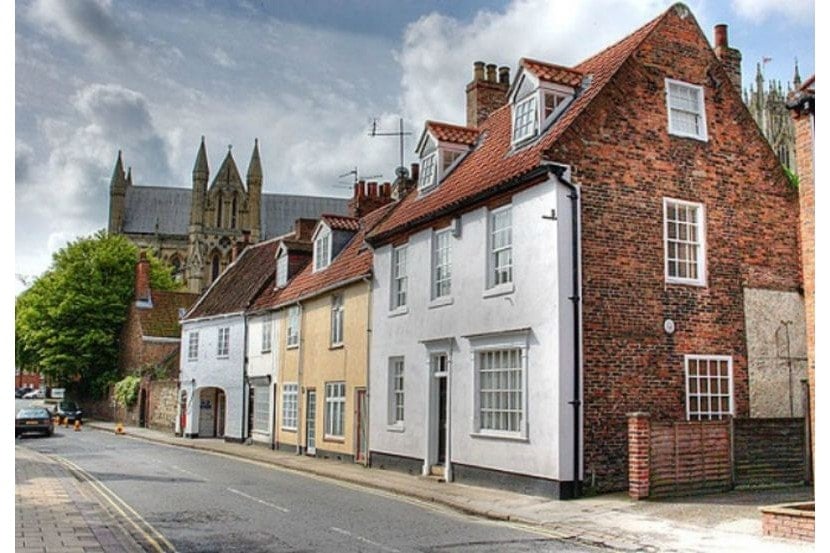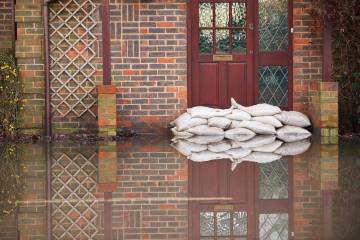If you need to claim on your home insurance you should contact your insurer directly. If you've been burgled though you should contact the police first.
In some circumstances it might not be worth claiming as it's likely to increase your insurance costs by over 60%*.
Here's what you need to know before you claim on your home insurance and what you need to make a claim.

Your home insurance claim checklist
Your steps to making a claim will vary depending on your reason for claiming. But here’s a basic checklist on what you need to do to make a home insurance claim:
-
If there's been a burglary, contact the police first.
-
If you can’t stay at the property or your home isn’t secure, contact your home insurance provider immediately. This is especially true if another party’s involved or there’s a risk of further damage.
-
Check your home insurance documents or the company’s website to find the claims phone number.
-
Make a list of what you feel are the most important facts. In the stress of the moment, it can be easy to forget relevant details like the time of day and weather conditions.
-
Contact your insurer to tell them you want to make a home insurance claim. It may need details including your policy number, address, and full name. Give as much information as possible about what's happened.
-
Take photos for evidence, and keep all receipts. Take photos of your receipts to keep a digital copy too.
-
Don't throw away damaged items - your home insurer may send a loss adjuster to asses the contents.
-
Keep track of all communications between you and your insurer, the police or witnesses.
-
Ask your insurer to approve any work that needs doing. Resist the temptation to get any repairs done until your insurer agrees, as you might not be able to claim for the costs.
Is it worth claiming on my home insurance?
You might not want to claim on your home insurance for several reasons:
- If you claim now, your future policies may become more expensive. In fact, claiming on your home insurance could increase your premium price by over £90*.
- Your no-claims discount could be affected when you make a claim.
- Your home insurance excess is deducted from any payout you get.
Here’s some of the most common claims on a buildings and contents insurance policy, and the claim amount:
| Top 5 common claims* | Claim amount* |
|---|---|
|
Contents insurance - escape of water
|
£8,017
|
|
Buildings insurance - escape of water
|
£9,344
|
|
Buildings insurance - storm damage
|
£3,108
|
|
Contents insurance - accidental loss or damage away from home
|
£1,538
|
|
Contents insurance - accidental loss or damage at home
|
£1,171
|
How can I work out if it’s worth claiming on my home insurance?
That depends on the claim itself. Some claims like modest breakages, might be too small to bother with and could be worth paying for yourself.
This is because you normally have to pay a home insurance excess when you make a claim. Small items are often below this limit and you won't be paid anything by the insurer.
Larger claims, like water or storm damage could be more expensive if you want to fix it yourself.
To give you an example here we'll look at 2 claims.
Claim 1: Your keys get stuck in the lock and you can't get them out. You need a locksmith to visit your home to remove the key.
Claim 2: Your new washing machine has flooded your kitchen floor. It needs extensive repair work before you can use the room again.
Before calling your insurer, have a think about the following questions:
| Questions to ask yourself | Claim 1 | Claim 2 |
|---|---|---|
|
What's the reason for claiming?
|
To use the lock again
|
To remove flood water and repair kitchen floor
|
|
How much will it cost?
|
Under £100
|
Between £500-£1000
|
|
How much is your excess?
|
£200
|
£200
|
|
Can you fix it yourself?
|
You could try - but if not, compare costs of a locksmith
|
No (unless you're a builder)
|
|
Can you live with the problem?
|
No
|
No
|
|
Is it worth claiming?
|
No - the cost to repair is probably more than you excess
|
Yes - even with the excess and a potential higher insurance costs you still save money by claiming
|
Before you claim, you should also make sure that your policy will cover you for what's happened.
Check your policy details for any special conditions that might mean your claim gets rejected. For example, if you make a buildings insurance claim for storm damage, and it turns out that your roof was in a bad state of repair before the storm.
Is there a time limit on home insurance claims?
Most insurers give you 180 days after the incident to claim, but this can vary depending on your policy and your insurer. But it’s best not to put off making a claim.
The sooner you make the claim, the sooner it can be resolved and any money can be paid out.
But if it’s an incident like burglary, make sure you call the police first. Your insurer will need the crime number as soon as possible.
How long do home insurance claims take?
The average time for a home insurance claim varies depending on how complex the claim is and who's dealing with it.
Because of the range of claims, there’s no agreed period or guarantee to settle claims.
Some buildings insurance cases are complex. For example, if there’s water or fire damage, some home insurance claims could take several months.
If the claim is going to be big, then you may need a loss adjuster involved. But if you’re claiming for smaller items on your contents insurance, it tends to be simpler.
Do I need evidence to support my home insurance claim?
Yes, you're normally expected to give the insurer any evidence it asks for - this sometimes includes any broken items.
You might need to support your home insurance claim with evidence such as:
- Receipts for any of your stolen or damaged valuables
- Any credit card or bank statements that show proof of buying the items
- Photos of any damage caused and photos of your belongings
If you’ve got CCTV footage of the incident, make sure the data is safe and reliable.
You may also record stolen items on online property databases such as:
- Immobilise
- NMPR
- Report My Loss
- CheckMEND
Recording your items this way means there’s a permanent record the police could check against. Some registers are free to use.
Can I pay to repair any damage myself?
Yes, if you don't want to claim on your insurance you can pay for the repairs yourself.
In some circumstances like a home emergency, you might not have any choice but to pay out for help straight away. In these cases you should try to stop any further damage happening, but try to talk to your insurer before doing anything else. Almost all insurers have a 24/7 claims helpline.
A home emergency is usually something that’s thought as:
- Bad for your health
- Risks damaging your home
- Compromises your home's security
You might have home emergency cover added to your buildings policy. It also usually covers the cost of burst pipes, pest infestation or blocked drains.
Will my home insurance costs go up after I make a claim?
Your premiums could increase by over 60%* if you decide to make a claim on your home insurance.
This is because Insurance prices are based on risk and after a claim insurers might think you’re more likely to claim again.
But sometimes claiming is necessary as it could be expensive to repair damage to your home or replace stolen items, for example.
Do home insurance claims follow you?
Yes your home insurance claims follow you. Insurers are able to see what previous claims you've made. They can check by looking at the Claims and Underwriting Exchange (CUE). This is a database where all claims are reported to insurance companies.
This can be the case even if a claim hasn’t been made. If an incident is reported to CUE, your home insurance claim stays on the database for 6 years after it's been closed.
When you get a quote with us, we'll ask you:
- How many years no-claims bonus you have for buildings and contents
- Whether you've made a claim or losses - for example, stolen possessions or vandalism- in the last 5 years
We'll also ask you if your property has ever had subsidence or been damaged by a fallen tree.
You can choose from the following options for a contents insurance claims:
- Arson
- Collision
- Explosion
- Falling Aerials
- Fire
- Flood
- Lightning
- Malicious Damage at home,away from home or outside the home
- Storm
- Subsidence
- Theft away from home, from home (including outbuildings), from outside the home
For buildings insurance claims, you can choose from these options:
- Accidental Loss/Damage at Home
- Arson
- Collision
- Explosion
- Falling Aerials
- Falling Tress
- Fire
- Flood
- Lightning
- Malicious Damage at Home
- Storm
- Subsidence
You should be honest as lying to an insurer can invalidate your claim.
Compare home insurance quotes
*Confused.com data. August 2022 - July 2023. Buildings, contents and combined home insurance policies.







